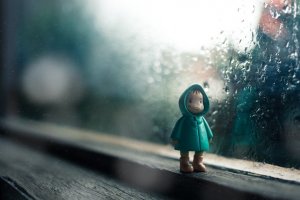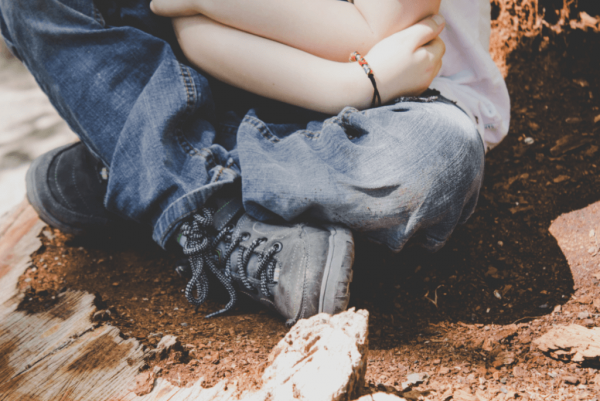Emotional problems: a danger that also creeps up on children

We all have the belief that childhood should be happy. Children should spend their time feeling positive emotions. Nothing bad should happen to them. Right? But the reality is that, like adults, children can suffer emotional problems.
Now, what makes some children suffer while others don’t? As with the elderly, there are a series of personal and social characteristics that make them vulnerable and these can make problems become harmful… Let’s discover them in order to better help our children!
“One of the luckiest things that can happen to you in life is, I think, to have a happy childhood.”
-Agatha Christie-
What makes children vulnerable to emotional problems?
First of all, let’s not forget that emotions play a role. This includes negative emotions. Therefore, it is necessary for us to feel angry sometimes to defend ourselves from something that is unfair.
Or for us to be afraid in order to protect ourselves from danger. Or for us to be sad so we can go through the grieving process that accompanies important losses.
The problem comes when those negative emotions are very intense, and they are constantly there. To put it in another way, negative emotions hurt us, and hurt others, when we are not able to constructively use their energy and message.
If this process is difficult for us, imagine how it is for children… This is why they need our help and our patience.

Also, with children there are certain risk factors associated with problems of emotional regulation. Having a difficult temperament or a high introversion are two of these factors. Others may be low awareness, impulsivity, inefficiency, attention problems, hyperactivity, high insecurity or deficits in information processing.
What increases the risk of emotional problems in children?
Children who have the characteristics mentioned above are more vulnerable to problems with emotional regulation. In addition, there are other factors, both in family, social and school environments, that can cause greater risk.
The family is a fundamental part of life for children. If there is hostility and family violence at home, it will increase emotional suffering for children.
This also causes lack of love and rejection. Regarding the parents, lack of control, disagreements, or money problems, as well as other psychiatric problems have a lot of influence on children.
“Children must have a lot of tolerance with adults.”
-Antoine de Saint-Exupery-
At a social level, having a low income and lack of social resources plays a part. At the school level, it seems that small schools help children better manage their emotions.
The negative expectations of teachers, the scale of school involvement, non-cooperative learning or the isolation and rejection from classmates can create greater risk.
Signs that indicate possible emotional problems in children
The fact that the characteristics we have just mentioned are risk factors means that children who have them are more likely to suffer emotional problems.
But, pay attention, it is also possible that a child is exposed to these risks, but does not have emotional problems. The question at this point is… how can we detect and help those that do?

First, children may ask for help if they feel bad, but it is not common. Therefore, it is the adults who interact with them, both parents and teachers, who have to be alert for possible emotional distress.
Signs of distress are a series of symptoms at the physical level, such as elevated heart rate, fatigue, nausea, dry mouth or muscle tension.
Children, in these circumstances also tend to have certain behaviors, such as avoidance, biting their nails, crying, trembling, shouting, breaking objects or fighting.
“It’s never too late to have a happy childhood”
-Tom Robbins-
Finally, we must pay attention to the thoughts they have. These can be toxic thoughts, thoughts of self-criticism, guilt, and fear. They can also have morbid imaginations or it can be difficult to for them to think about other things.
In addition, they can be defensive or have problems concentrating. All this indicates that all is not well with the child and… it’s time to ask for help!
Images courtesy of Andrik Langfield, Chinh Le Duc and JJ Thompson.
We all have the belief that childhood should be happy. Children should spend their time feeling positive emotions. Nothing bad should happen to them. Right? But the reality is that, like adults, children can suffer emotional problems.
Now, what makes some children suffer while others don’t? As with the elderly, there are a series of personal and social characteristics that make them vulnerable and these can make problems become harmful… Let’s discover them in order to better help our children!
“One of the luckiest things that can happen to you in life is, I think, to have a happy childhood.”
-Agatha Christie-
What makes children vulnerable to emotional problems?
First of all, let’s not forget that emotions play a role. This includes negative emotions. Therefore, it is necessary for us to feel angry sometimes to defend ourselves from something that is unfair.
Or for us to be afraid in order to protect ourselves from danger. Or for us to be sad so we can go through the grieving process that accompanies important losses.
The problem comes when those negative emotions are very intense, and they are constantly there. To put it in another way, negative emotions hurt us, and hurt others, when we are not able to constructively use their energy and message.
If this process is difficult for us, imagine how it is for children… This is why they need our help and our patience.

Also, with children there are certain risk factors associated with problems of emotional regulation. Having a difficult temperament or a high introversion are two of these factors. Others may be low awareness, impulsivity, inefficiency, attention problems, hyperactivity, high insecurity or deficits in information processing.
What increases the risk of emotional problems in children?
Children who have the characteristics mentioned above are more vulnerable to problems with emotional regulation. In addition, there are other factors, both in family, social and school environments, that can cause greater risk.
The family is a fundamental part of life for children. If there is hostility and family violence at home, it will increase emotional suffering for children.
This also causes lack of love and rejection. Regarding the parents, lack of control, disagreements, or money problems, as well as other psychiatric problems have a lot of influence on children.
“Children must have a lot of tolerance with adults.”
-Antoine de Saint-Exupery-
At a social level, having a low income and lack of social resources plays a part. At the school level, it seems that small schools help children better manage their emotions.
The negative expectations of teachers, the scale of school involvement, non-cooperative learning or the isolation and rejection from classmates can create greater risk.
Signs that indicate possible emotional problems in children
The fact that the characteristics we have just mentioned are risk factors means that children who have them are more likely to suffer emotional problems.
But, pay attention, it is also possible that a child is exposed to these risks, but does not have emotional problems. The question at this point is… how can we detect and help those that do?

First, children may ask for help if they feel bad, but it is not common. Therefore, it is the adults who interact with them, both parents and teachers, who have to be alert for possible emotional distress.
Signs of distress are a series of symptoms at the physical level, such as elevated heart rate, fatigue, nausea, dry mouth or muscle tension.
Children, in these circumstances also tend to have certain behaviors, such as avoidance, biting their nails, crying, trembling, shouting, breaking objects or fighting.
“It’s never too late to have a happy childhood”
-Tom Robbins-
Finally, we must pay attention to the thoughts they have. These can be toxic thoughts, thoughts of self-criticism, guilt, and fear. They can also have morbid imaginations or it can be difficult to for them to think about other things.
In addition, they can be defensive or have problems concentrating. All this indicates that all is not well with the child and… it’s time to ask for help!
Images courtesy of Andrik Langfield, Chinh Le Duc and JJ Thompson.
This text is provided for informational purposes only and does not replace consultation with a professional. If in doubt, consult your specialist.







